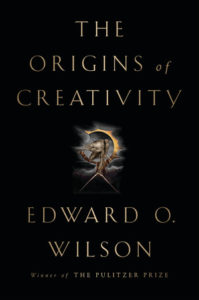 I will admit, right at the start, that I am an admirer of Edward O. Wilson, the Harvard biologist and professor emeritus. I’ve read and been stimulated by many of his earlier works: Half-Earth (2016), The Meaning of Human Existence (2014), The Social Conquest of Earth (2012), and Anthill (2010).
I will admit, right at the start, that I am an admirer of Edward O. Wilson, the Harvard biologist and professor emeritus. I’ve read and been stimulated by many of his earlier works: Half-Earth (2016), The Meaning of Human Existence (2014), The Social Conquest of Earth (2012), and Anthill (2010).
So too with this most recent work. It is a paean to the humanities and science, and “why we are both supremely advanced and supremely dangerous,” leading to ”creativity (as) the unique and defining trait of our species; and its ultimate goal, self-understanding” and “the innate quest for originality.”
We are a questioning species, constantly asking what, how, and why. Wilson argues that “it should be axiomatic that education of the young consists of a wisely chosen balance between science and the humanities,” avoiding the current over-emphasis on STEM (Science, Technology, Engineering, Mathematics).
He recounts two previous “enlightenments,” the first around 500 B.C. with the Greeks, including Socrates, Plato, and Aristotle, and the second from 1600 to 1800, with Descartes, Spinoza, Hobbes, Locke, Rousseau, and Voltaire. Today, he sees a possible Third Enlightenment with the marriage of the humanities and science. This wedding can help improve our natural instinct for empathy, “the intelligence to read the feelings of others and predict their actions” using our capacity for language to “recount episodes of the past and those imaginable into the future.”
This is a work of challenging questions (what, why, when, and especially how), also posing possible answers merging science and the humanities through Wilson’s knowledge of paleontology, anthropology, psychology, evolutionary biology, and neurobiology. He also cites literature, music and painting to illustrate his argument.
His conclusion: “Scientists and scholars in the humanities, working together, will, I believe, serve as the leaders of a new philosophy, one that blends the best and most relevant of these two great branches of learning”.
Editor’s Note: ‘The Origins of Creativity’ by Edward O. Wilson is published by W. W. Norton, New York 2017.

Felix Kloman
About the Author: Felix Kloman is a sailor, rower, husband, father, grandfather, retired management consultant and, above all, a curious reader and writer. He’s explored how we as human beings and organizations respond to ever-present uncertainty in two books, ‘Mumpsimus Revisited’ (2005) and ‘The Fantods of Risk’ (2008). A 20-year resident of Lyme, he now writes book reviews, mostly of non-fiction that explores our minds, our behavior, our politics and our history. But he does throw in a novel here and there. For more than 50 years, he’s put together the 17 syllables that comprise haiku, the traditional Japanese poetry, and now serves as the self-appointed “poet laureate” of Ashlawn Farm Coffee, where he may be seen on Friday mornings. His wife, Ann, is also a writer, but of mystery novels, all of which begin in a village in midcoast Maine, strangely reminiscent of the town she and her husband visit every summer.